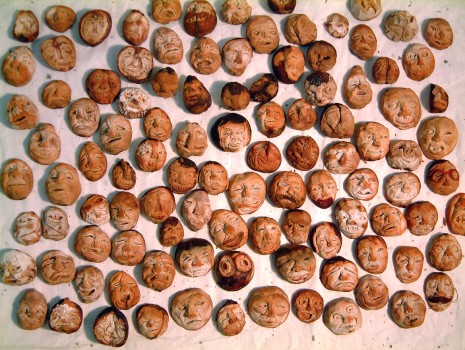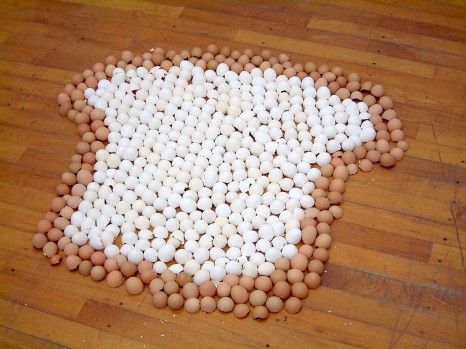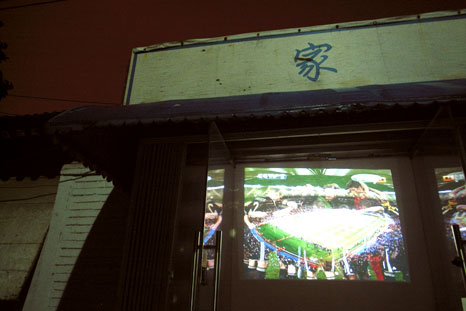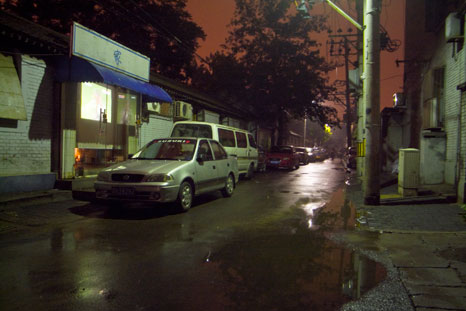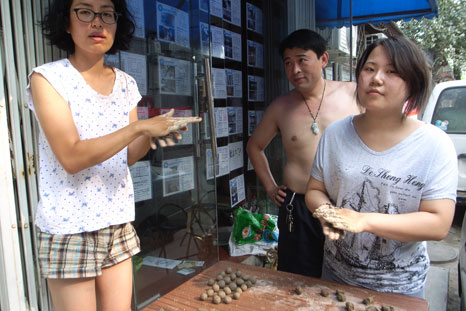 吴以楠(右边)和植村絵美(左边)在家作坊门口制作“种子炸弹”,老二(中间)过来帮忙做质量控制。WU Yinan (at right) and Emi UEMURA (left) make seed bombs in front of HomeShop, Brother ZHENG (center) drops by to do quality control.
吴以楠(右边)和植村絵美(左边)在家作坊门口制作“种子炸弹”,老二(中间)过来帮忙做质量控制。WU Yinan (at right) and Emi UEMURA (left) make seed bombs in front of HomeShop, Brother ZHENG (center) drops by to do quality control.
___
下面的文章是由一个在胡同长大的女孩儿写的。她是家作坊的邻居和朋友,叫吴以楠。她在小经厂胡同6号(家作坊旁边!)出生并成长,后来她又搬到菊儿胡同居住了几年,之后便像大多数胡同里的老北京人一样搬到了楼房。在从淮北师范大学毕业以后她回到了北京,今年初她装修了小经厂胡同的老房子并跟她男朋友搬回来住。最近我们偶然发现了她在写博客,而且写的很不错,因此我们将在家作坊的博客分享一些她的感想和经历。
The following text is written by friend and neighbour of HomeShop WU Yinan. She was born and raised at Xiaojingchang Hutong number 6, then went away for a period to Ju’er Hutong before finally joining the great number of old Beijingers to move out of the hutongs and into a multi-story flat. After graduating from university in Huaibei she moved back to Beijing, and at the beginning of this year she renovated the old family home and came back to live there with her boyfriend. We recently found out that she maintains a blog, from which we will co-feature some of her thoughts and writings here.
In light of all the recent gossip, foreign media and NGO hype about pending demolition of parts of the Gulou area to make way for subway lines, a time museum and shopping centres galore, perhaps what we should remember is that a lot of this area is already relatively new making way for the even newer. This is of course not a form of tacit consent, but these makeovers have been happening all along. Yinan’s post is titled “First make a ruin of Houhai and then of Nanluoguxiang, Let me see what else you all will make a ruin of next”, and expresses a lot of her anger about the reek of ‘xiaozi‘ (kind of like a youthful, big-spending hipster type) that has blown into Beijing since the days of her childhood spent around Gulou and Houhai.
怒了,真的怒了,自从我搬回鼓楼住以后,身边的一切似乎早已不是儿时的回忆了,我自然不是抵制发展进步的人,但是忽然觉得全国文化味儿最浓的地方,突然全变了味儿,而且都变成了一个味儿!
我出生在鼓楼东大街的一个小院儿里,童年的记忆离不开后海的轻风,地安门的繁华,钟鼓楼的端庄,锣鼓巷的素朴,后来搬到了簋街旁边,眼睁睁的看着这个地方 从一个狭窄拥挤的大排档一条街变成了一个更为拥挤油腻的饭馆街。可以说,我从小就围绕着这些现在被炒作的一塌糊涂的地方生活,深知其中变化无穷。
小时候的后海很安静,微风轻抚着柳树带来阵阵凉爽,微波粼粼的湖面让人心旷神怡,早上有老人在湖边练太极,舞剑,一群老头老太太在湖里游泳,春夏秋冬,四 季从不中断。我夏天的记忆悠闲地漂浮在后海的鸭子船里,冬天的记忆则穿着冰鞋徜徉在厚厚的什刹海冰面上,最后一个记忆的碎片就是和我最好的知心朋友坐在湖 边的石头上,一边吹着风欣赏湖面上美丽的景色,一边在柳条声的伴奏下吃着后面超市里买的凉面,那惬意劲就别提了……在外地上了四年大学回来后竟然发现后海 再也不是我儿时的那个天堂了,伴随着叮咣震耳的音乐,四射至天空的霓虹和激光束,后海貌似忽然化作一个黄头发蓝眼睛白皮肤的顽皮小孩对我说“骨德儿白”。 虽然曾经和住在这里的朋友一起寻觅过童年的印记,但是无论如何我似乎已不再认识你了……
行至今日,我搬回了鼓楼的老房子居住,很少有去逛后海的冲动,后海已经变成了城市人,外地人,外国人的后花园,可以任意的放肆,交友,娱乐,我不反对清静 之地变得喧闹不堪,只是经常可怜住在附近院子里的老头老太太们,他们再也没有清静自在的日子过了,真怕他们因此而折寿;也怕那些无耻的商人窥视着这些在此 过了一辈子的老头老太太们毕生守护的房子,想用来投机投资而让他们离开他们钟爱了一辈子的老地方。
从后海出来一定要走烟袋斜街,烟袋斜街在我小时候的印象里就是个澡堂子,里面有个华清池,每次去都很喜欢那里休息的小房间,用木板隔断,有两个床位,中间 有个桌子,桌子上还有茶杯和袋泡茶。晚上的时候澡堂会出租给住宿的人,我见过很多人涌进来搭床铺的场面,可能是挺便宜吧,住宿的人那么多……
现在早已不见了华清池这个澡堂子,卖纪念品的,特色服装饰品,还有饭馆和酒吧,喧闹的小巷到处弥漫着浓烈的香水气息,混合着酒精和饭菜的味道,就一路来到拆的乱七八糟,早已不再繁华的地安门。
地安门的没落让我黯然神伤了好久,曾经最喜欢一路从地安门百货商场逛过各种琳琅满目的小店,直到平安大街,现在也没什么可看的了,拆的拆,关的关,是要建地铁吧,将来这里我希望会更繁华,但是千万别建成纪念品一条街……
之后来到我暴怒的一条街——南锣鼓巷!
因为曾经在菊儿胡同住过好多年,每次放学回家都会走南锣鼓巷,所以我有发言权!!
现在南锣鼓巷可是大名鼎鼎,饭馆林立,酒吧扎堆儿。打着文化牌,做着商业化的事,甚至为此不惜重金的让电视台让主持人念叨念叨,再拍个电视剧什么的,弄得大家都认为南锣鼓巷是北京最后一块没有被污染的净土,纷纷跑去污染。
对了,北京怎么能有净土呢?不能,一定不能够!力争发现一块污染一块,争取全都污染完。
南锣鼓巷乃是北京城平常的不能再平常,普通的不能再普通的一条胡同,只因为他串起来周边许多纵向的胡同,而这些纵向的胡同里有个把官宦和名人的府邸,就突 然这么炒热起来了……北京东西城的胡同名人官宦的府邸多了去了,这对我这个从小长在北京的人已经是稀松平常的事,那会北京城就到二环路,而且东富西贵,除 去紫禁城不能住,可不都住东西城的胡同里么!我常常怀疑,是不是这些什刹海后花园的人发现光逛个后花园不过瘾,才在旁边又弄出个南锣鼓巷来消遣。
我不反对南锣鼓巷作为一个文化和历史遗迹的标的而得以繁荣,恶心就恶心在,压根南锣鼓巷的繁华就和老北京的文化不搭界!你到酒吧里说来瓶小二,人家说我们 这里只有科罗娜,你说来碗炸酱面,人家说我们这只有三明治……等等等,还有新疆烤串,四川风味,意大利披萨,水果沙拉,青海酸奶,印度首饰,总而言之就是 没老北京味儿!文化没看到,光看到酒吧了。三五成群的老外混搭着满嘴洋文的中国小资,喝着啤酒调侃着人生。问老外你敢不敢跟我来个二窝头,老外就“no no”,就算不知道要入乡随俗,也不能让乡随了老外,临了走到尽头还建了个“贞节牌坊”上书“南锣鼓巷”,形状与“国子监”一般,一看就是个新玩意儿,什 么时候南锣鼓巷需要牌坊了,搞笑!
想起前两年去云南旅游的时候丽江古城的杯具,在北京小资心里那是个神圣的去处,如此忧愁多情之流,到了才发现城的建筑很美,但是说白了就是个酒吧纪念品饭 馆之城,同行的假小资们煞有介事的在酒吧里忧郁的品尝着美酒咖啡,表情既享受又有几分沉醉,有的还付费点一段唱走掉的音乐来彰显自己的品味,全部都是繁华 的浮躁,几乎淹没了丽江古城原始的素朴,就快要找不到曾经痕迹了,而如今的南锣鼓巷,后海,颇有步丽江后尘的意味,逐步走向小资心目中的忧愁多情交友品味 之地,外国人心目中的第二个“故乡”。
糟践吧,继续糟践,我们伟大的历史遗迹和文化精魄马上就要在内有崇洋小资,外有寻欢老外的联合攻势下蒸发的看不到痕迹了。
有的时候和一些真心寻找北京文化的老外聊天,他们对这些地方都有鄙夷之神色,宁可在其他不繁华的胡同里徜徉,寻觅,也不愿踏足那个已经变味儿的温柔乡。
—–
— 转载自《人生就像绕口令》,转载于2010年6月1日 / First published 1 June 2010 by WU Yinan at Life is Like a Tongue Twister.
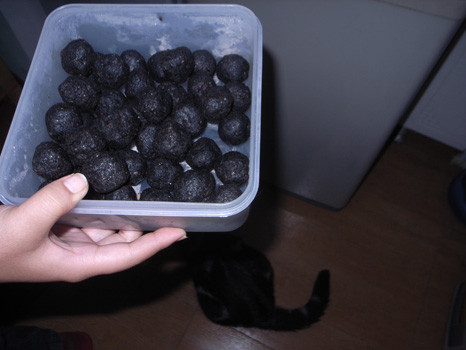 我做的“ballsy大力丸“。My homemade 有种 high-energy pills.
我做的“ballsy大力丸“。My homemade 有种 high-energy pills.
 时间 posted on: 30 September 2010 |
时间 posted on: 30 September 2010 |  发布者 author:
发布者 author: 
 分类 filed under:
分类 filed under: 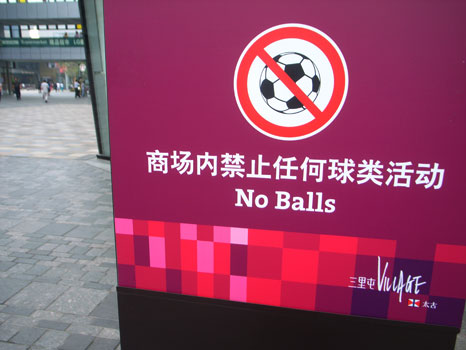
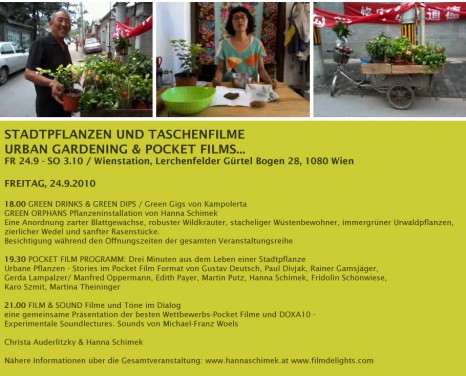
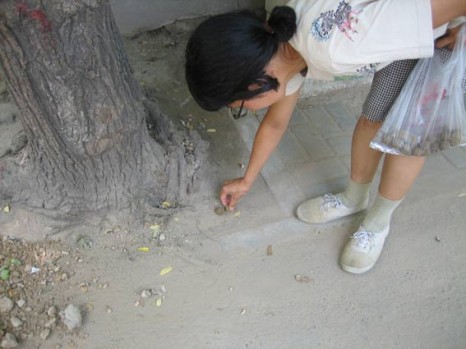
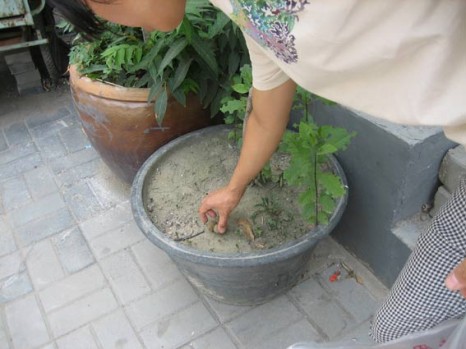
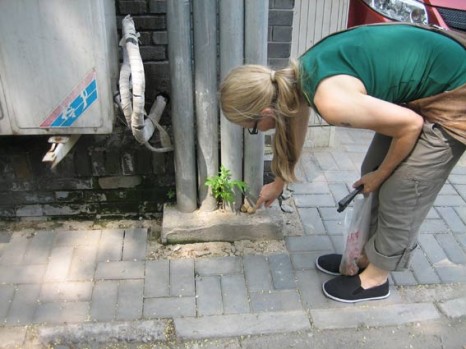
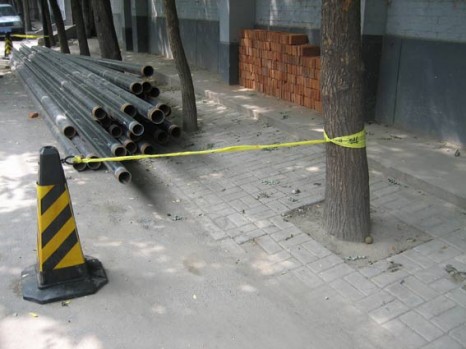
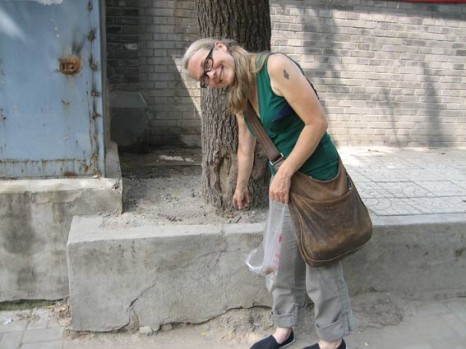
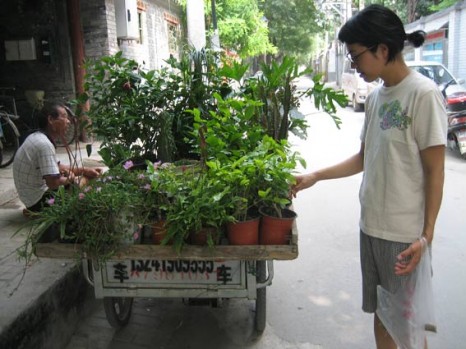
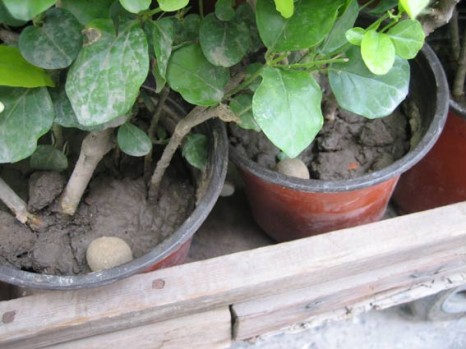
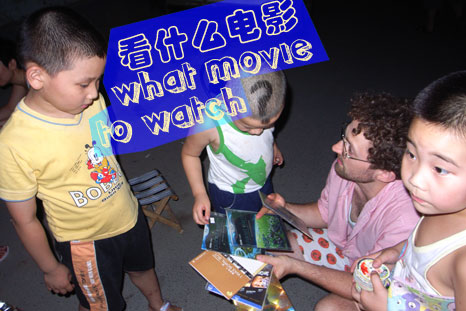 “
“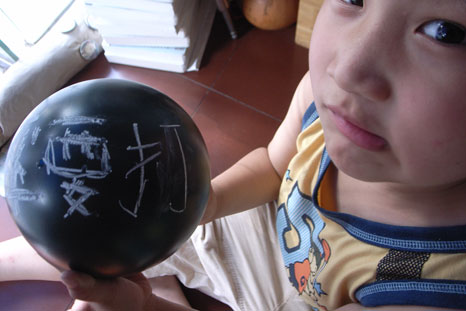
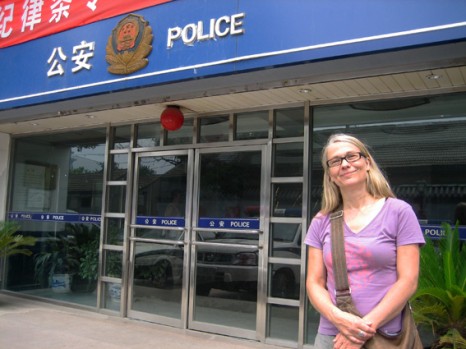 艺术家
艺术家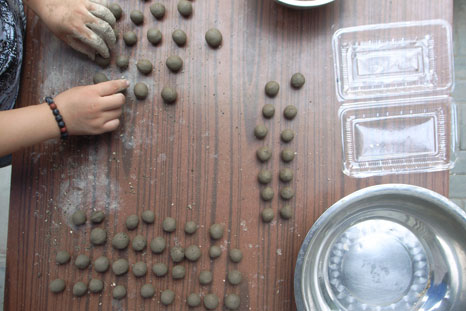 “
“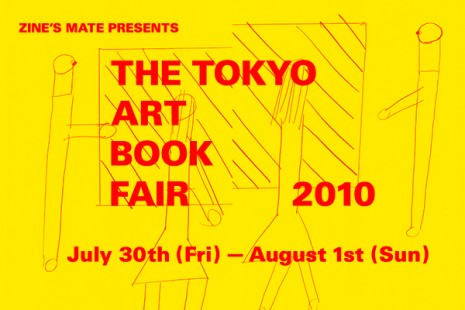
 吴以楠(右边)和植村絵美(左边)在家作坊门口制作“
吴以楠(右边)和植村絵美(左边)在家作坊门口制作“